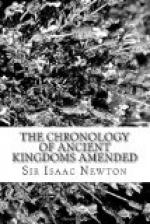[13] tells us: he lived in the 105th Olympiad,
and was derided by
Plato for his Ignorance.
This Breviary seems to have contained nothing more
than a short account of the Victors in every Olympiad.
Then [14]
Ephorus, the disciple of
Isocrates,
formed a Chronological History of
Greece, beginning
with the Return of the
Heraclides into
Peloponnesus,
and ending with the Siege of
Perinthus, in
the twentieth year of
Philip the father of
Alexander
the great, that is, eleven years before the fall of
the
Persian Empire: but [15] he digested
things by Generations, and the reckoning by the Olympiads,
or by any other
AEra, was not yet in use among
the
Greeks. The
Arundelian Marbles
were composed sixty years after the death of
Alexander
the great (
An. 4.
Olymp. 128.) and yet
mention not the Olympiads, nor any other standing
AEra, but reckon backwards from the time then
present. But Chronology was now reduced to a
reckoning by Years; and in the next Olympiad
Timaeus
Siculus improved it: for he wrote a History
in Several books, down to his own times, according
to the Olympiads; comparing the
Ephori, the
Kings of
Sparta, the Archons of
Athens,
and the Priestesses of
Argos with the Olympic
Victors, so as to make the Olympiads, and the Genealogies
and Successions of Kings and Priestesses, and the
Poetical Histories suit with one another, according
to the best of his judgment: and where he left
off,
Polybius began, and carried on the History.
Eratosthenes wrote above an hundred years after
the death of
Alexander the great: He was
followed by
Apollodorus; and these two have
been followed ever since by Chronologers.
But how uncertain their Chronology is, and how doubtful
it was reputed by the Greeks of those times,
may be understood by these passages of Plutarch.
Some reckon Lycurgus__, saith he, [16] contemporary
to Iphitus_, and to have been his companion in
ordering the Olympic festivals, amongst whom was Aristotle
the Philosopher; arguing from the Olympic Disc, which
had the name of Lycurgus upon it. Others
supputing the times by the Kings of Lacedaemon,
as Eratosthenes and Apollodorus, affirm
that he was not a few years older than the first Olympiad._
He began to flourish in the 17th or 18th Olympiad,
and at length Aristotle made him as old as
the first Olympiad; and so did Epaminondas,
as he is cited by AElian and Plutarch:
and then Eratosthenes, Apollodorus, and
their followers, made him above an hundred years older.
And in another place Plutarch [17] tells us:
The Congress of Solon_ with Croesus,
some think they can confute by Chronology. But
a History so illustrious, and verified by so many
witnesses, and which is more, so agreeable to the
manners of Solon, and worthy of the greatness
of his mind, and of his wisdom, I cannot persuade
my self to reject because of some Chronological Canons,
as they call them, which hundreds of authors correcting,
have not yet been able to constitute any thing certain,
in which they could agree amongst themselves, about
repugnancies._




